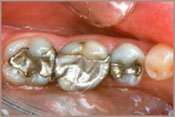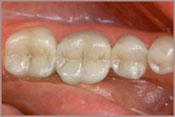Cleanings | Sealants | Tooth-Colored Fillings | Tooth Extractions | Composite Bonding | Root Canal Treatment | Night Guards | Mouth Guards | Fluoride
Cleanings
Our practice can provide a wide range of dental services. We can typically provide every type of dental service without having to refer you to other specialties. This flexibility saves you time and keeps your total dental care within one practice. Our emphasis is on total preventive care for our patients. Total care begins with regular hygiene visits, regular check-ups and continued home oral health routines.
Our practice also provides the highest-quality services for restoring mouths that have been damaged by dental disease and injury and common problems that require cosmetic dentistry. Our primary goal for our patients is to achieve and maintain optimum oral health through advances in techniques, technologies and by maintaining their scheduled dental exams.
Sealants
The grooves and depressions that form the chewing surfaces of the back teeth are extremely difficult (if not impossible) to clean of bacteria and food. As the bacteria reacts with the food, acids form and break down the tooth enamel, causing cavities. Recent studies indicate that 88 percent of total cavities in American school children are caused this way.
Tooth sealants protect these susceptible areas by sealing the grooves and depressions, preventing bacteria and food particles from residing in these areas. Sealant material is a resin typically applied to the back teeth, molars and premolars and areas prone to cavities. It lasts for several years but needs to be checked during regular appointments.
Tooth-Colored Fillings
 metal fillings
The concept of a "filling" is replacing and restoring your tooth structure that is damaged due to decay or fracture with a material. We will replace old, broken-down amalgam/metal fillings that contain traces of mercury with white fillings (composites) to restore your smile and teeth to a more natural look and feel.
metal fillings
The concept of a "filling" is replacing and restoring your tooth structure that is damaged due to decay or fracture with a material. We will replace old, broken-down amalgam/metal fillings that contain traces of mercury with white fillings (composites) to restore your smile and teeth to a more natural look and feel.
 white fillings
With today’s advancements, no longer will you have to suffer the embarrassment of unsightly and unhealthy silver/mercury fillings or metal margins of the past. Eliminate the dark, black appearance in your teeth with new-age, state-of-the-art, tooth-colored resin or porcelain materials.
white fillings
With today’s advancements, no longer will you have to suffer the embarrassment of unsightly and unhealthy silver/mercury fillings or metal margins of the past. Eliminate the dark, black appearance in your teeth with new-age, state-of-the-art, tooth-colored resin or porcelain materials.
Comparing White Fillings versus Silver Amalgam Fillings:
- White fillings bond to the tooth; they strengthen the tooth by restoring most of its original shape. Silver amalgams, on the other hand, weaken the teeth and make them more susceptible to breaking. Broken teeth can be very expensive to replace; white amalgam can actually save time and money in the long run.
- White filling composites are preferred by most patients. This is due to the natural color, strength and overall appearance and feel. Composites are naturally more comfortable.
- Hot and cold sensitivity is greatly reduced with composite material compared to the silver/mercury amalgams.
- Restorations with composites require less removal of tooth, less structure to place than those with amalgams and especially with new cavities. Dramatically smaller holes are needed with a composite.
- White fillings are healthier because no traces of mercury are used, unlike silver amalgams.
General Extractions
An extraction is the complete removal of a tooth. Extractions are sometimes necessary if a primary tooth is preventing the normal eruption of a permanent tooth, if the tooth has suffered extensive tooth decay or trauma that cannot be repaired, if the patient has gum disease, or if the tooth is impacted (usually the wisdom teeth). Depending on the complexity of the case, an extraction can be performed surgically or non-surgically. A mild anesthesia is used to ensure your child is as comfortable as possible throughout the procedure.
Wisdom Teeth
Your third molars are more commonly called "wisdom teeth." Usually appearing in the late teens or early twenties, third molars often lack the proper space in the jaw to erupt fully or even at all. This common condition is called impaction. When any tooth lacks the space to come through or simply develops in the wrong place of your jaw and becomes impacted, problems can arise. Primarily, damage to adjacent teeth and crowding occur.
In certain cases, the wisdom tooth that cannot come through becomes inflamed under the gums and in the jawbone, causing a sac to develop around the root of the tooth that then fills with liquid. This can cause a cyst or an abscess if it becomes infected. If either of these situations goes untreated, serious damage to the underlying bone and surrounding teeth and tissues can result.
To potentially stave off this result, an extraction of one, several or all of the wisdom teeth may be advised. If that is the case, we have the equipment and training needed to perform such extractions, with an absolute minimum of discomfort. Ask our staff for more information regarding tooth extractions if you feel you may need one.
Composite Bonding
Bonding is a common solution for:
- Fixing or repairing chipped or cracked teeth
- Reducing unsightly gaps or spaces between teeth
- Hiding discoloration or faded areas on the tooth’s surface
Often, composite bonding is used to improve the appearance of your teeth and enhance your smile. As the name indicates, composite material, either a plastic or resin, is bonded to an existing tooth. Unlike veneers or crowns, composite bonding removes little, if any, of the original tooth.
Composite bonding has many advantages:
- It is a quick process, which typically lasts less than one hour.
- It does not reduce the tooth’s original structure and is relatively inexpensive.
- Composite resins come in many different shades and provide better matching of shades to the natural color of your teeth.
- Composite bonds, however, are not as durable and long-lasting as veneers and crowns and may need to be re-touched or replaced in the future.
Composite bonds stain more easily and therefore require proper care and regular cleaning. In order to ensure the longest possible duration of the bonding, composites should be brushed and flossed daily. Common staining elements include coffee, tea, tobacco, foods and candy.
Root Canal Treatment
A root canal is a procedure that extracts decayed pulp from the central part of the tooth, reshapes the canal and replaces it with strengthening filler.
A cavity is the result of superficial decay of the enamel of the tooth. Left long enough, this decay can burrow into the deeper reaches of the tooth, causing extensive damage to tooth structure. When the damage goes beyond what can be treated with a filling, dentists can perform a root canal (or endodontics), preserving the tooth and retaining its original integrity; thereby, saving a tooth that in the past would have to have been pulled.
This procedure involves:
- The patient undergoes anesthesia.
- A dental dam is used to isolate the tooth.
- The tooth is opened to allow for removal of infected or dead dental pulp.
- The tooth is comprehensively cleaned, including any cracks and canals.
- With special tools, the doctor reshapes the canals.
- The tooth is filled again with cutting edge biocompatible filling material.
- A temporary covering is used to cover the access opening.
- Patients must see their regular dentist quickly for a permanent restoration of the tooth.
Night Guards
A night guard is a hard plastic retainer placed over either the top or bottom row of your teeth. It is designed to help prevent or slow the damage done to teeth by grinding or clenching. Nighttime grinding and clenching can wear down the tooth enamel, eventually leading to major dental procedures such as root canals, tooth extractions, crown placements and oral surgery. Night guards can also help sufferers of disorders of the temporomandibular joint (TMJ). With a properly designed night guard, the wear on this enamel is decreased, therefore slowing the damage to the teeth.
Mouth Guards
We are pleased to offer our patients custom-fabricated mouth guards for sports activities. Unlike stock mouth guards, which fit loosely because they are designed to accommodate many possible wearers, our sports mouth guards are tailored to fit your exact dental profile, providing the highest attainable level of comfort and security in a mouth guard.
The first step in fabricating these mouth guards is to take an impression of your teeth. We then use that impression and fabricate the mouth guard using special professional-grade materials. The perfect fit of these custom-fabricated mouth guards ensures that not only will your mouth guards fit comfortably; they will also offer the most protection and will interfere the least with speech or breathing.
Fluoride
Fluoride is a substance that helps teeth become stronger and resistant to decay. Regularly drinking water treated with fluoride and brushing and flossing regularly ensures significantly lower cavities. Dentists can evaluate the level of fluoride in a primary drinking water source and recommend fluoride supplements (usually in tablets or drops), if necessary.